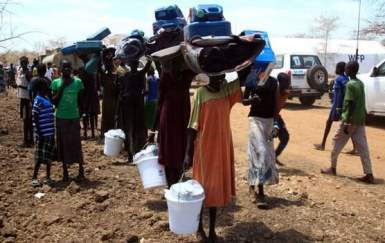S. Sudan faces dilemma over aid distribution routes in Upper Nile
July 1, 2014 (JUBA) – The South Sudanese government is in a bind over delivery of humanitarian assistance to rebel-held areas, with officials trading accusations over the selection of distribution routes used.

“We are getting reports of the civilians in Ulang and Nasir counties crossing again to areas under the rebel control to access food because officials at the ministry of humanitarian affairs and disaster management, especially those involved in the coordination of relief assistances gave wrong information to the United Nations world food programme. I don’t understand why this happened? Kueth Kang Deng, who is the chairperson of the relief and rehabilitation commission (SRRC), seems to have not provided correct information about distribution routes and locations,” Gordon Buay, a former rebel official, told Sudan Tribune Sunday.
Buay said roads needed for delivery of the food rations from Malakal, the Upper Nile capital to the conflict affected displaced areas under the government control in the state have been opened for truck convoys and rivers are accessible for barges to deliver “emergency relief for people in need now”.
He accused the official of having failed to perform to the expectation of the displaced.
Upper Nile’s state governor Simon Kun Puoc, however, admitted that there were administrative issues his administration would like to settle with relevant officials and institutions involved in the coordination for the delivery of the humanitarian assistances to the displaced in the area.
“The government has done everything possible to facilitate easy movement of the delivery trucks areas under our control. What we want now is the provision of correct information by the concerned officials and institutions involved in the coordination for delivery of food rations to our people. We don’t want them to cross to the other side. We want the food rations and other relief items to be delivered directly to them in areas where they would be safe,” Puoc said on Tuesday.
“I mean where security would be provided by the government”, he added.
Meanwhile, Nasir county commissioner, Dak Tap separately confirmed that civilians trapped in the rebels held areas in the region were getting humanitarian assistances, but that it was unclear whether the food goes to them or it was being diverted.
“As the government in the state and county we think it would be wise if we are involved in the coordination for the delivery of the relief assistances, especially delivery routes and in the selections of the location for distribution purposes because we know where our people are. Those involved in the coordination should actually get information from us so [that] correct information is obtained by relief organisations,” Tap said in an interview on Tuesday.
Sudan Tribune was unable to independently verify the veracity of the claims made over the diversion of the food rations after delivery in the rebels held areas, although several rebel officials dismissed the allegations, describing it as “mere political propaganda of the government supporters against their leadership”.
“This is not true. There is nothing like that. This is just a mere political propaganda by the government. We are actually concerned about the safety of our people and which is why they cross to the areas under our control because they feel safe. They get maximum protection with all their properties and other belongings,” Hussein Maar Nyuot, head of the opposition’s humanitarian committee, said.
President Salva Kiir and rebel leader Riek Machar met face to face in May for the first time since violence erupted more than six months ago, during which the two rival leaders held hands and prayed together in Addis Ababa, Ethiopia before signing the peace agreement.
The two principals pledged before regional leaders their readiness to cease all hostilities and open up humanitarian corridors. They also agreed that a transitional government offers the best chance to take the country forward. There were no immediate details on who would be part of the proposed interim administration.
Negotiations have dragged on for several months with little progress, while violence has killed thousands and displaced more than 1.2 million people.
(ST)
